Harvey Webb was long aware of his minor place in Georgia Tech and state history, but didn’t think much of it. As a freshman at Tech in the 1967-68 academic year, he made the Yellow Jackets freshman team and became the first black Tech student to play for the basketball team.
Growing up, Webb’s daughter Fonda Martin said that it sometimes came up and then the conversation quickly moved on.
“I think that it is definitely in his nature, to kind of brush it under the rug and not really talk about it, because he’s just a modest person,” Martin said.
History has long recognized Karl Binns, who played on the 1971-72 Tech varsity team, as Tech’s first black basketball player. However, in coming to learn of Webb’s place in its history in recent weeks, the school has accorded him honor. So it was that at halftime of the Jackets’ Feb. 21 game against N.C. State, the 67-year-old Webb, a lifelong Atlantan, found himself at center court of McCamish Pavilion. He shared the spotlight with his daughter, niece and grandson, applause from a standing ovation washing down upon him, recognition almost 50 years after the fact.
“It felt good,” Webb said. “I think I told my niece I swolled up for a minute because all I could think of was my mom and how much she would have enjoyed just sharing that moment.”
Webb’s mother, Earline Lummus, who died in 2012, would certainly understand the journey more than almost anyone. She raised her son in a time when the idea of a black man being warmly applauded by an arena full of mostly white people for integrating a basketball team might have been a challenge to the imagination. In 1967, when Webb graduated from Harper High School on Atlanta’s west side and enrolled at Tech, race riots flashed across the country. Georgia’s governor was the segregationist Lester Maddox. Atlanta Public Schools were slowly integrating.
Two years earlier, Ronald Yancey became Tech’s first African-American graduate after being rejected multiple times and then experiencing isolation on campus (he never had a lab partner, according to the school) and being given hurdles other students weren’t. Tech exempted seniors from final exams, but Yancey was given 18 exams in his final three weeks of school.
Webb said he had a four-year academic scholarship to Morehouse College, but he had to carry a 3.0 GPA to keep it. Uncertain he could manage it, he decided to enroll at Tech, thinking it would ultimately be less expensive. Webb estimated there were 13 black students at Tech at the time, which would be less than half of 1 percent of the enrollment. A look at the yearbook suggests that, if his memory was faulty, it wasn’t by much.
“You didn’t go to all-white schools,” Webb said. “It wasn’t done.”
It was his first experience with integrated schooling, and he recalled the catching up he had to do with his white counterparts.
“We weren’t on par with the level of education that (white students) had received,” Webb said. “Let’s just call it like it was.”
Webb frequently made time for pickup games at the school armory. There, a fellow freshman, a white student, told him that he was going to try out for the freshman team and that Webb should, too. Webb recalls the tryout process being simple – drills followed by scrimmaging.
“I would say this,” Webb said. “I was the best out there. There was no doubt about that.”
It was four years before Binns would become Tech’s first black scholarship basketball player, but coach Whack Hyder and his staff awarded Webb a spot on the team.
As Webb recalled, the team’s first game was at Auburn. He said he hadn’t thought about the significance of his participation until an assistant coach, Eddie Jackel, told him he was making history.
“That’s when I got scared,” Webb said. “Because, before, it had never fazed me.”
Through the season, Webb said that he heard catcalls and boos, but “it wasn’t to the extent where it was so noticeable.” Largely, his memories are of an inclusive and welcoming team.
“I didn’t give it a second thought, to be truthful,” he said about joining the team. “I knew about the issues that were going on and so forth with integration. I was somewhat naïve. I really didn’t put much stock into, Would I be accepted? I was just playing basketball. The guys on the team accepted me. I had no problems with them. It was fun.”
A teammate, John Stanford, recalled a similar environment.
“Harvey was just fantastic,” Stanford said. “I think probably he was the most popular person on the freshman team.”
As a walk-on, Webb was far from the team’s star. Two of his teammates were among Tech’s greatest ever – Rich Yunkus and Jim Thorne, both in the school’s hall of fame.
Webb’s season ended prematurely, as he fractured his wrist in a game. He did not try out as a sophomore and left Tech before graduation. He had other priorities. He had gotten married and taken a night job at the Federal Reserve Bank of Atlanta.
He eventually earned an economics degree from Georgia State and later worked for SunTrust before starting a variety of business ventures with partners. He is particularly proud of a program that he ran for a few years in the 90’s with a business partner, Russ Wheeler, for schoolchildren in Atlanta’s inner city in which they took students who met academic standards on fishing trips around the state of Georgia.
He said his experience at Tech, where he was interacting with white people on a wide basis for the first time in his life, gave him confidence.
“I gained primarily socially, in the sense that my ability to achieve was based just on me,” he said. “I could compete with anyone.”
In the 1971-72 season, Binns became the first black basketball player on scholarship. He stayed one season before transferring, years later telling the AJC that he left in part because of racist attitudes.
Over the years, Webb mentioned his role to family, but didn’t think much of it. Last year, while cleaning out his office, Stanford found a team picture and a copy of the Dec. 8, 1967 Atlanta Constitution article that reported the results of the Tech-Georgia freshman game while cleaning out his office. He posted both on his Facebook account and tried getting in touch with Webb. The story mentioned Webb’s historic moment in the second-to-last paragraph. Stanford, an Atlanta businessman, said he was stunned to learn it.
“At the time, it didn’t have any significance to us,” he said. “Harvey was just one of us.”
Tom Taylor, who played with Binns at Tech and was Stanford’s roommate, saw the posts and was able to get in touch with Webb. Taylor connected with Tech alumnus and player personnel director Mario West, who invited him to the team’s letterwinner event following the Notre Dame game and then helped honor him during the N.C. State game.
Webb’s daughter, an obstetrician/gynecologist in Atlanta, and niece Sakari Balam, an educator at Crim High, prodded him to accept the invitation.
“This is one of those things where you have to let people know so we can continue to pass this on,” Martin said.
Balam was caused to think of the movie “Hidden Figures,” the recently released movie about the largely anonymous role that African-American female mathemeticians played at NASA at the height of the space race.
“That really hit home with me and it made me see that life is short and he does need to get his flowers while he’s here,” Balam said.
It is West’s hope that Webb will continue to come around the team, joining the circle of basketball alumni. West, who is black, acknowledged the gratitude he owes Webb for helping make it possible for him and others to play for the Jackets.
“He had the courage to pursue something that he loved and dreamed of doing,” West said.
Webb, divorced and still living in Atlanta, said he plans to come back to Tech games with his 3-year-old grandson Pierce Martin. And, after a half-century after his groundbreaking action, he sees his actions from 1967 with a different perspective.
“Now, I’m beginning to see maybe it was important, maybe it meant more so than I ever thought it did,” he said.
About the Author







